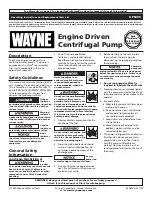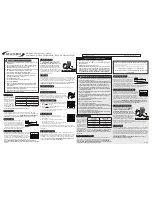
WARNING!
TO REDUCE THE POTENTIAL FOR PERSONAL INJURY KEEP HANDS WELL AWAY FROM THE CUTTERHEAD DURING JOINT-
ING OPERATIONS - USE PUSH BLOCKS WHENEVER POSSIBLE.
Face Jointing
1) Set the infeed table height for the desired depth of cut. Note: 1/16” to 1/32” is recommended depending on the width of the board.
2) Set and lock the fence at 90º.
3) To limit cutterhead exposure and reduce the risk of serious injury position and lock the fence over the tables to expose the cutterhead no more
than 1/2” wider than the board to be jointed.
4) Plug in and turn on the jointer.
5) Place the cupped or concave face of your board against the table and tight to the fence, and using the included push blocks guide the board
along the table and over the cutterhead.
6) Turn off the jointer and inspect the face of the board - repeat the jointing steps as needed until the face is flat.
Edge Jointing
1) Set the infeed table height for the desired depth of cut. Note: 1/8” to 1/16” is recommended depending on the width of the board.
2) Set and lock the fence at 90º.
3) To limit cutterhead exposure and reduce the risk of serious injury position and lock the fence in place over the tables to expose the cutterhead
no more than 1/2” wider than the board to be jointed.
4) Plug in and turn on the jointer.
5) Place the cupped or concave edge of your board against the table and tight to the fence, and guide the board along the table and over the cut-
terhead.
6) Turn off the jointer and inspect the edge of the board, repeat the jointing steps as needed until the edge is flat.
Bevel Jointing
Bevel joining is done similar to edge jointing but with the fence set to a desired angle other than 90º to the table.
MAINTENANCE
WARNING!
TO REDUCE THE POTENTIAL FOR PERSONAL INJURY MAKE SURE THE MACHINE IS TURNED OFF AND HAS BEEN UN-
PLUGGED BEFORE PERFORMING ANY MAINTENANCE OPERATIONS.
Regular Maintenance
To ensure optimum performance and longer service life of your jointer the following basic maintenance steps should be practiced regularly:
1) Inspect the power chord and plug for damage before each use. Never operate the jointer with a damaged power chord or plug. To reduce the
risk of electric shock, unexpected start-up, and/or damage to the motor, replace a damaged power chord or plug immediately.
2) Test the ON/OFF switch before each use. Never operate the jointer with a damaged/ malfuntioning switch. To reduce the risk of electric shock,
unexpected start-up, and/or damage to the motor, replace a damaged/malfunctioning switch immediately.
3) Keep the jointer and its tables clean and free of debris, sawdust, woodchips, glue. Vacuum or brush off loose debris and wipe down the machine
regularly with a damp rag.
4) Regularly inspect freshly jointed boards for signs of worn or damaged cutterhead inserts. Replace worn/damaged cutterhead inserts immedi-
ately.
OPERATION & MAINTENANCE




























